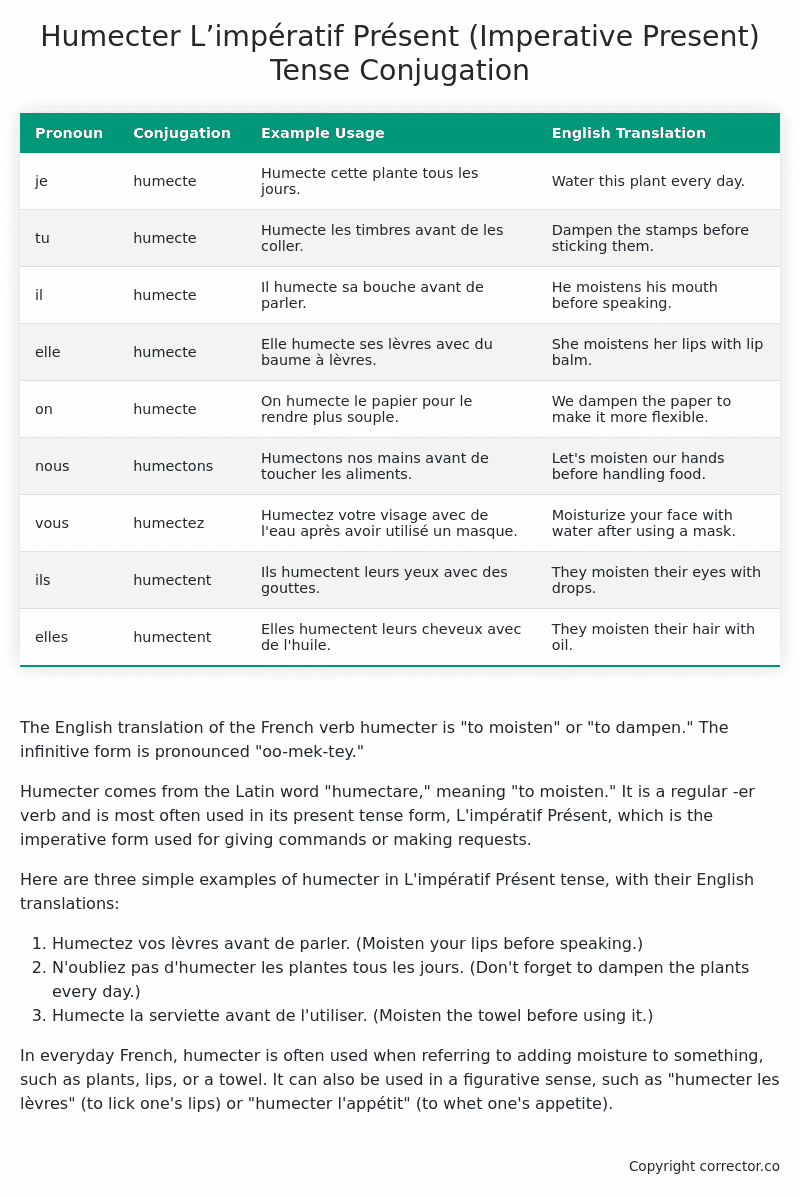L’impératif Présent (Imperative Present) Tense Conjugation of the French Verb humecter
Introduction to the verb humecter
The English translation of the French verb humecter is “to moisten” or “to dampen.” The infinitive form is pronounced “oo-mek-tey.”
Humecter comes from the Latin word “humectare,” meaning “to moisten.” It is a regular -er verb and is most often used in its present tense form, L’impératif Présent, which is the imperative form used for giving commands or making requests.
Here are three simple examples of humecter in L’impératif Présent tense, with their English translations:
- Humectez vos lèvres avant de parler. (Moisten your lips before speaking.)
- N’oubliez pas d’humecter les plantes tous les jours. (Don’t forget to dampen the plants every day.)
- Humecte la serviette avant de l’utiliser. (Moisten the towel before using it.)
In everyday French, humecter is often used when referring to adding moisture to something, such as plants, lips, or a towel. It can also be used in a figurative sense, such as “humecter les lèvres” (to lick one’s lips) or “humecter l’appétit” (to whet one’s appetite).
Table of the L’impératif Présent (Imperative Present) Tense Conjugation of humecter
| Pronoun | Conjugation | Example Usage | English Translation |
|---|---|---|---|
| je | humecte | Humecte cette plante tous les jours. | Water this plant every day. |
| tu | humecte | Humecte les timbres avant de les coller. | Dampen the stamps before sticking them. |
| il | humecte | Il humecte sa bouche avant de parler. | He moistens his mouth before speaking. |
| elle | humecte | Elle humecte ses lèvres avec du baume à lèvres. | She moistens her lips with lip balm. |
| on | humecte | On humecte le papier pour le rendre plus souple. | We dampen the paper to make it more flexible. |
| nous | humectons | Humectons nos mains avant de toucher les aliments. | Let’s moisten our hands before handling food. |
| vous | humectez | Humectez votre visage avec de l’eau après avoir utilisé un masque. | Moisturize your face with water after using a mask. |
| ils | humectent | Ils humectent leurs yeux avec des gouttes. | They moisten their eyes with drops. |
| elles | humectent | Elles humectent leurs cheveux avec de l’huile. | They moisten their hair with oil. |
Other Conjugations for Humecter.
Le Present (Present Tense) Conjugation of the French Verb humecter
Imparfait (Imperfect) Tense Conjugation of the French Verb humecter
Passé Simple (Simple Past) Tense Conjugation of the French Verb humecter
Passé Composé (Present Perfect) Tense Conjugation of the French Verb humecter
Futur Simple (Simple Future) Tense Conjugation of the French Verb humecter
Futur Proche (Near Future) Tense Conjugation of the French Verb humecter
Plus-que-parfait (Pluperfect) Tense Conjugation of the French Verb humecter
Passé Antérieur (Past Anterior) Tense Conjugation of the French Verb humecter
Futur Antérieur (Future Anterior) Tense Conjugation of the French Verb humecter
Subjonctif Présent (Subjunctive Present) Tense Conjugation of the French Verb humecter
Subjonctif Passé (Subjunctive Past) Tense Conjugation of the French Verb humecter
Subjonctif Imparfait (Subjunctive Imperfect) Tense Conjugation of the French Verb humecter
Subjonctif Plus-que-parfait (Subjunctive Pluperfect) Tense Conjugation of the French Verb humecter
Conditionnel Présent (Conditional Present) Tense Conjugation of the French Verb humecter
Conditionnel Passé (Conditional Past) Tense Conjugation of the French Verb humecter
L’impératif Présent (Imperative Present) Tense Conjugation of the French Verb humecter (this article)
L’infinitif Présent (Infinitive Present) Tense Conjugation of the French Verb humecter
Struggling with French verbs or the language in general? Why not use our free French Grammar Checker – no registration required!
Get a FREE Download Study Sheet of this Conjugation 🔥
Simply right click the image below, click “save image” and get your free reference for the humecter L’impératif Présent tense conjugation!

Humecter – About the French L’impératif Présent (Imperative Present) Tense
Usage
Giving commands
Making requests
Offering advice
Expressing desires
Conjugation Formation
Interactions with other tenses
Want More?
I hope you enjoyed this article on the verb humecter. Still in a learning mood? Check out another TOTALLY random French verb conjugation!


